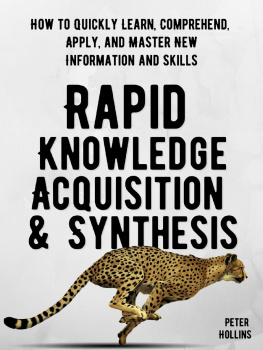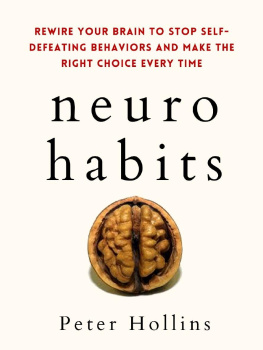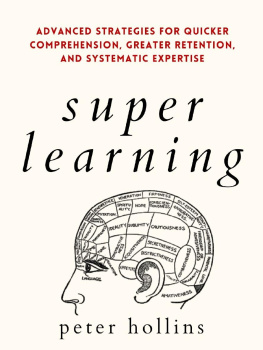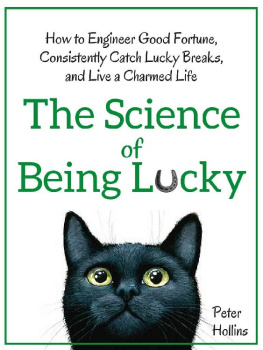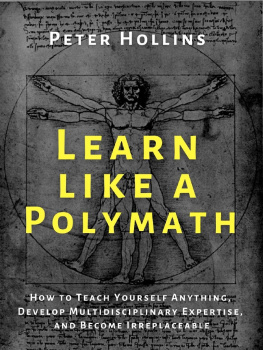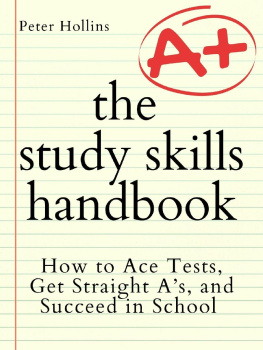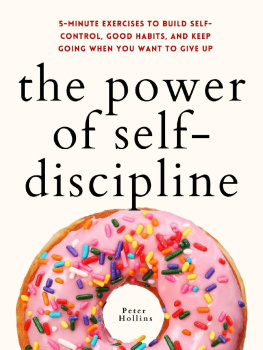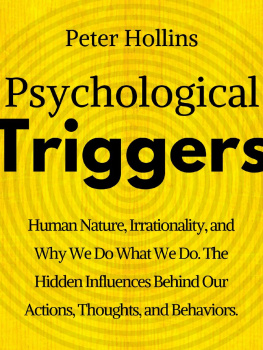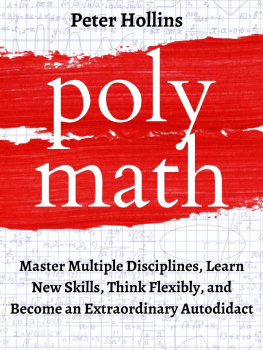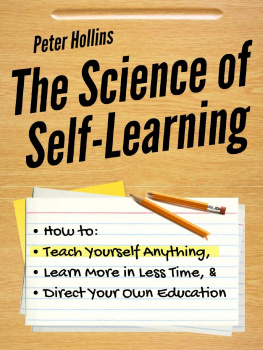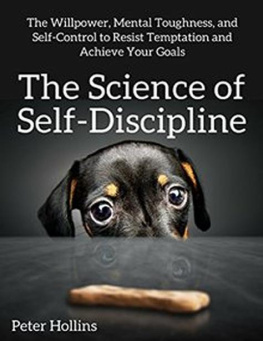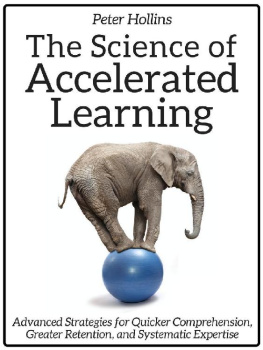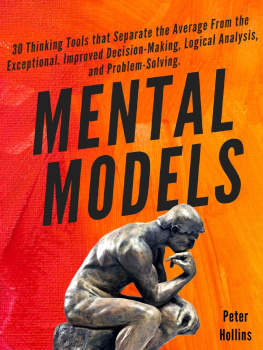Table of Contents
Rapid Knowledge Acquisition & Synthesis:
How to Quickly Learn, Comprehend, and Apply, and Master New Information and Skills
By Peter Hollins,
Author and Researcher at petehollins.com

CLICK HERE for your FREE 14-PAGE MINIBOOK: Human Nature Decoded: 9 Surprising Psychology Studies That Will Change the Way You Think. > >
--Subconscious Triggers
-- Emotional Intelligence
-- Influencing and Analyzing People

Table of Contents
Table of Contents
Its not about smarts
Maybe its all about avoiding failure
More effective goal formation
Style, format, and sources
Single and double loop learning
The theory-in-use
Adapt and grow
Four steps to reading
SQ3R
Questions for thought
Socrates the great
The Luhmann method
The Ahrens method
Technique 1: Self-explanation and purposeful elaboration
Technique 2: Variety is the spice of information absorption
Technique 3: What you do when youre not learning
Technique 4: Perfect practice makes perfect
Technique 5: Use dual coding
Chapter One. Your Obstacles Are Everyones Obstacles
Whether youre a university student, trying to grasp a new skill or simply attempting to improve your performance at work, learning how to learn may well be the best skill you ever acquire. Whatever our chosen area of expertise, well always fare better if we pay conscious attention to how we learnwhether thats taking more effective notes, processing new information better, quickly comprehending material or simply learning to read lightning fast.
How we learn is what gets us from Point A to Point B; it is the vehicle that we drive, and we can choose to arrive in a rusted jalopy, or a smooth and sleek Ferrari.
We often assume there is only one way to learn, or that people will naturally find the optimal approach without trying too hard. We believe everyone learns through processes that they are most comfortable, and thus productive, with. Nothing could be further from the trutheffective learning is a meta skill that improves our ability to learn all other skills, and its something we need to deliberately and consistently cultivate in ourselves if we hope to improve.
This book is about learningabout how to become better at acquiring, processing and retaining knowledge and skills of all kinds. Learning is a complex process of being aware of, managing, comprehending, absorbing, synthesizing and recalling information on an ongoing basis. The better were able to manipulate and handle information according to our goals and needs, the more deeply we understand, and the more thorough our learning process.
With that being said, why do so few people spend time developing their ability to learn? Why is there not more attention paid to learning for its own sake, or to sharpening those abilities that support and enable all our other ones?
Unfortunately, becoming better at learning is seldom easy. There are obstacles that prevent people from fully exploring their intellectual potential, and have them operating at a lower, less efficient level out of pure habit. This is why well begin this book not with the techniques themselves, but with all the things that ordinarily impede our mastery of them. In removing our own resistance, we gain better access to better learning.
Its not about smarts
Can you think of any potential obstacles to learning? If youre like most people, you might have listed poor time management, not having great study skills or simply lacking intelligence.
Maybe the kind of environments where you typically try to learnhome, school, etc.havent been the most conducive to acquiring knowledge. Distractions, and negative past experiences such as bad teachers or boring, one-dimensional school curricula, are all reasons why someone might be turned off by the concept of learning something new. In rare cases, obstacles might also be presented by physical disabilities such as perceptual or memory issues.
The truth, however, is that most learning attempts are jeopardized way before you get to the stage of sitting down to learn. In other words, the obstacles that are most likely to derail your effective learning are usually psychological and behavioral, not strategic. This means that improving your methods may have a very limited effect in the first instance if you havent addressed the deeper barriers that are preventing you from ever getting started with them.
Firstly, this is not a matter of laziness or a poor attitude. In fact, many of the mental and psychological obstacles well discuss here are simply part of human nature, or are otherwise encouraged and even rewarded in our workplaces, schools and society in general.
Human beings want to learn, in many cases, because they desire mastery. What is mastery except the ability to control and command something? Instead of being at the mercy of an unknown, we might seek to dismantle and understand it, so that its us who can then manipulate, control or predict the phenomena we confront in the world around us.
But its this need for control that can actually backfire in the learning process. In our struggle to retain control, and to avoid any state of vulnerability or ignorance, we may act in ways that actually limit our perspective and keep us failing harder and for longer.
Stemming from this larger unconscious motivation is the need to think of learning as mere problem-solving, as something we do to winover our colleagues, over our own weakness, over nature itself. It follows then that well be squeamish and intolerant of losing (or what we characterize as losing) and so behave, again, in ways that actually ensure we lose all the more often. This is often a question of ego, pride, and the avoidance of the nasty feeling of failure. As you may have noticed in other areas of your life, this avoidance of pain can be a quite powerful motivator.
Using learning and knowledge acquisition as a means to increase control also encourages us to be as rational as possible, to be infallible, perfect, complete. We will want things to follow neat, orderly and linear logic and be unable to bear uncertainty or ambiguity with any patience or nuance. Again, by doing so we only close down our field of possibility and force a narrower vision of learning on ourselves.
An attitude that approaches learning in this way may work in some contexts, for some of the time, but it will never be as good as approaching learning with a truly open, curious mindone that is receptive, creative and willing to tolerate the unknown or feelings of incompetence along the road to mastery. One attitude is expansive, open-ended and curious. The other is fearful, controlling and narrowing. Both can lead to learning, but one path will be far easier and more successful!
Being bad at learning is seldom a question of technique and more a problem of attitude or perspective. Today, there is a popular model proposed by psychology professor Carol Dweck outlining the difference between a growth mindset and a fixed mindset. This model closely mirrors the fundamental differences in attitude one might bring to learning.
A fixed mindset is just thatfixed. Static. This is the person who insists that the experience of life come to them in a predictable, unalterable way. This is the person who believes that human abilities are inborn and that you either have or dont have. Creativity, intelligence or being a fast learner are simply attributes you possess in an unchanging way.

